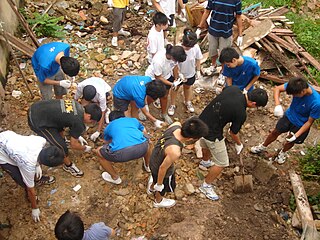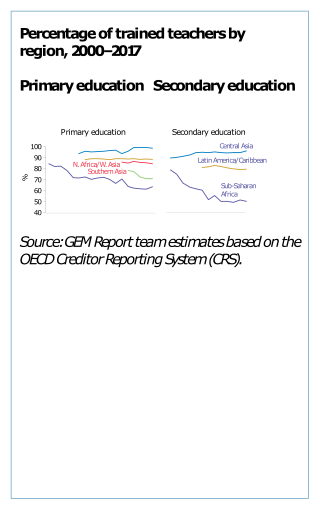
The career is an individual's metaphorical "journey" through learning, work and other aspects of life. There are a number of ways to define career and the term is used in a variety of ways.
The Association of College and Research Libraries defines information literacy as a "set of integrated abilities encompassing the reflective discovery of information, the understanding of how information is produced and valued and the use of information in creating new knowledge and participating ethically in communities of learning". In the United Kingdom, the Chartered Institute of Library and Information Professionals' definition also makes reference to knowing both "when" and "why" information is needed.

Service-learning is an educational approach that combines learning objectives with community service in order to provide a pragmatic, progressive learning experience while meeting societal needs.
Learning styles refer to a range of theories that aim to account for differences in individuals' learning. Although there is ample evidence that individuals express personal preferences for how they prefer to receive information, few studies have found any validity in using learning styles in education. Many theories share the proposition that humans can be classified according to their "style" of learning, but differ in how the proposed styles should be defined, categorized and assessed. A common concept is that individuals differ in how they learn.

Student affairs, student support, or student services is the department or division of services and support for student success at institutions of higher education to enhance student growth and development. People who work in this field are known as student affairs educators, student affairs practitioners, or student affairs professionals. These student affairs practitioners work to provide services and support for students and drive student learning outside of the classroom at institutions of higher education.
Residence Life is the comprehensive program that surrounds the experience of living "on and off campus" in a residence hall at a college or university. Residence Life is usually structured with planned events, a code of conduct and ethics, and a relatively large array of staff.
Educational technology is the combined use of computer hardware, software, and educational theory and practice to facilitate learning. When referred to with its abbreviation, "EdTech," it often refers to the industry of companies that create educational technology. In EdTech Inc.: Selling, Automating and Globalizing Higher Education in the Digital Age, Tanner Mirrlees and Shahid Alvi (2019) argue "EdTech is no exception to industry ownership and market rules" and "define the EdTech industries as all the privately owned companies currently involved in the financing, production and distribution of commercial hardware, software, cultural goods, services and platforms for the educational market with the goal of turning a profit. Many of these companies are US-based and rapidly expanding into educational markets across North America, and increasingly growing all over the world."
International education refers to a dynamic concept that involves a journey or movement of people, minds, or ideas across political and cultural frontiers. It is facilitated by the globalization phenomenon, which increasingly erases the constraints of geography on economic, social, and cultural arrangements. The concept involves a broad range of learning, for example, formal education and informal learning. It could also involve a reorientation of academic outlook such as the pursuit of "worldmindedness" as a goal so that a school or its academic focus is considered international. For example, the National Association of State Universities prescribes the adoption of "proper education" that reflects the full range of international, social, political, cultural, and economic dialogue. International educators are responsible for "designing, managing, and facilitating programs and activities that help participants to appropriately, effectively, and ethically engage in interactions with culturally diverse people and ideas."
Reflective practice is the ability to reflect on one's actions so as to take a critical stance or attitude towards one's own practice and that of one's peers, engaging in a process of continuous adaptation and learning. According to one definition it involves "paying critical attention to the practical values and theories which inform everyday actions, by examining practice reflectively and reflexively. This leads to developmental insight". A key rationale for reflective practice is that experience alone does not necessarily lead to learning; deliberate reflection on experience is essential.

Civic engagement or civic participation is any individual or group activity addressing issues of public concern. Civic engagement includes communities working together or individuals working alone in both political and non-political actions to protect public values or make a change in a community. The goal of civic engagement is to address public concerns and promote the quality of the community.

Teacher education or teacher training refers to programs, policies, procedures, and provision designed to equip (prospective) teachers with the knowledge, attitudes, behaviors, approaches, methodologies and skills they require to perform their tasks effectively in the classroom, school, and wider community. The professionals who engage in training the prospective teachers are called teacher educators.
A learning community is a group of people who share common academic goals and attitudes and meet semi-regularly to collaborate on classwork. Such communities have become the template for a cohort-based, interdisciplinary approach to higher education. This may be based on an advanced kind of educational or 'pedagogical' design.
Formative assessment, formative evaluation, formative feedback, or assessment for learning, including diagnostic testing, is a range of formal and informal assessment procedures conducted by teachers during the learning process in order to modify teaching and learning activities to improve student attainment. The goal of a formative assessment is to monitor student learning to provide ongoing feedback that can help students identify their strengths and weaknesses and target areas that need work. It also helps faculty recognize where students are struggling and address problems immediately. It typically involves qualitative feedback for both student and teacher that focuses on the details of content and performance. It is commonly contrasted with summative assessment, which seeks to monitor educational outcomes, often for purposes of external accountability.
Student engagement occurs when "students make a psychological investment in learning. They try hard to learn what school offers. They take pride not simply in earning the formal indicators of success, but in understanding the material and incorporating or internalizing it in their lives."

Open education is an educational movement founded on openness, with connections to other educational movements such as critical pedagogy, and with an educational stance which favours widening participation and inclusiveness in society. Open education broadens access to the learning and training traditionally offered through formal education systems and is typically offered through online and distance education. The qualifier "open" refers to the elimination of barriers that can preclude both opportunities and recognition for participation in institution-based learning. One aspect of openness or "opening up" education is the development and adoption of open educational resources in support of open educational practices.

Indigenous education specifically focuses on teaching Indigenous knowledge, models, methods, and content within formal or non-formal educational systems. The growing recognition and use of Indigenous education methods can be a response to the erosion and loss of Indigenous knowledge through the processes of colonialism, globalization, and modernity.
MERLOT is an online repository and international consortium of institutions of higher education, industry partners, professional organizations and individuals. MERLOT partners and members are devoted to identifying, peer reviewing, organizing and making available existing online learning resources in a range of academic disciplines for use by higher education faculty and students.
School climate refers to the quality and character of school life. It has been described as "the heart and soul of the school ... that essence of a school that leads a child, a teacher, and an administrator to love the school and to look forward to being there each school day." A positive school climate helps people feel socially, emotionally and physically safe in schools. It includes students', parents' and school personnel's norms, beliefs, relationships, teaching and learning practices, as well as organizational and structural features of the school. According to the National School Climate Council, a sustainable, positive school climate promotes students' academic and social emotional development.

Sustainable Development Goal 4 is about quality education and is among the 17 Sustainable Development Goals established by the United Nations in September 2015. The full title of SDG 4 is "Ensure inclusive and equitable quality education and promote lifelong learning opportunities for all".
Joseph B. Berger is a social scientist, educationist, and academic. He is a professor of education, and Provost and Vice Chancellor for Academic Affairs at the University of Massachusetts Boston.







